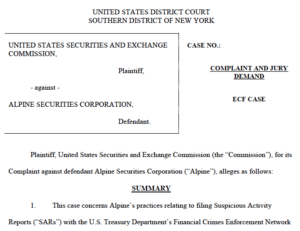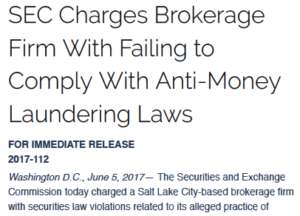Types Of SEC Cases: Suspicious Activity Report Violations
SEC Charges Clearing Firm With Thousands Of Suspicious Activity Report Violations
The SEC charged a Salt Lake City based broker-dealer with breaking federal securities laws for thousands of transactions in which it committed suspicious activity report violations. In its court Complaint, the SEC alleged that Alpine Securities Corporation (“Alpine”), which acts as a self-clearing firm for microcap over-the-counter (“OTC”) stock transactions, broke federal securities laws through the way in which it cleared transactions that were used in manipulative schemes to harm investors.
The SEC’s court Complaint
As alleged in our complaint, by failing to file SARs, Alpine Securities deprived regulators and law enforcement of critically important information often related to trades in microcap securities used to investigate potentially serious misconduct.

The SEC’s press release
Failure To Follow Compliance Program Contributed To Suspicious Activity Report Violations
Alpine maintained a bank secrecy compliance program that included written supervisory procedures, and formal and informal training for its employees. However, according to the court Complaint, Alpine did not follow its own written procedures. The SEC alleged that Alpine committed suspicious activity report violations by routinely and systematically failing to identify and report known suspicious activity in its SARs filings. According to the SEC, Alpine’s suspicious activity report violations included:-
- Systematically omitting from at least 1,950 SARs material, “red-flag” information that it was aware of and was required to report under its own BSA Compliance Program, such as a customer or issuer’s criminal or regulatory history, evidence of stock promotion, or whether a customer was a foreign financial institution. This included at least 1,150 SARs that contained only the customer name, date of deposit, dollar value of deposit, and the name of the security deposited;
-
- SARs were filed in approximately 1,900 instances in which stock was deposited at Alpine. But no SARs were filed for subsequent related transactions such as the liquidations of that stock, or the transfers of funds resulting from those liquidations, even though Alpine had previously identified the deposits of those securities as suspicious; and
-
- Failing to file at least 250 SARs within the required 30 days after the date the suspicious activity was detected.
Disgorgement And Penalties
The SEC sought permanent injunctions against Alpine that would enjoin the Firm from engaging in the transactions, acts, practices, and courses of business alleged in the court Complaint. The Commission also sought civil penalties under the Exchange Act and any other relief the Court deemed appropriate.Whistleblowers Can Report Suspicious Activity Report Violations And Money Laundering To The SEC
This case illustrates some types of misconduct that could give rise to SEC whistleblower cases if reported to the Commission through the SEC whistleblower program. However, the SEC has not made any public statement as to whether this case was itself an actual SEC whistleblower case. The SEC Office of the Whistleblower posts Notices of Covered Action (“NoCA”) for Commission actions where a final judgment or order results in monetary sanctions exceeding $1 million. The NoCA list does not disclose if a particular Enforcement action was brought as the result of an SEC whistleblower case, tip, complaint, or referral being filed with the Commission.Additional Information
For more information about suspicious activity report violations and money laundering, click on the links below:- The SEC’s court Complaint in SEC v. Alpine. (External link to the SEC’s website.)
- The SEC’s Press Release announcing the charges in SEC v. Alpine. (External link to the SEC’s website.)







